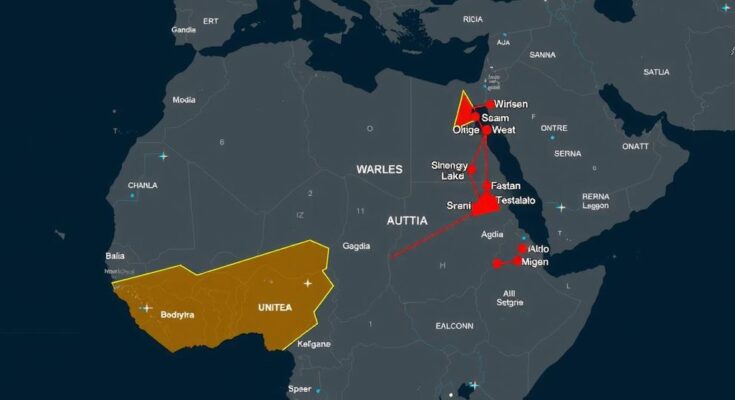A recent summit involving Egypt, Eritrea, and Somalia indicates a strategic alignment in the Horn of Africa, particularly aimed at addressing concerns regarding Ethiopia’s influence. The summit symbolizes a potential shift in regional power dynamics, emphasizing military cooperation and territorial sovereignty while risking escalated tensions with Ethiopia, whose actions in the region remain contentious.
The recent diplomatic engagement involving Egypt, Eritrea, and Somalia marks a significant transformation in the geopolitical landscape of the Horn of Africa, a region long characterized by instability and regional rivalries. This notable trilateral summit, convened in Asmara, Eritrea, aimed to present a united front amid ongoing regional security challenges, with Ethiopia, a major player in the area, remaining the focal point of these discussions. While the summit publicly emphasized cooperation and autonomy among the three nations, underlying intentions suggest a strategy to encircle Ethiopia, which remains close by, amid rising tensions concerning its regional activities. Eritrea’s President Isaias Afwerki, Egypt’s President Abdel Fattah al-Sisi, and Somalia’s President Hassan Sheikh Mohamud highlighted the necessity to uphold territorial integrity and resist external interference in their collective statement, signaling a response to perceived threats from Ethiopian actions. The Horn of Africa is fraught with intricate alliances and historical animosities, positioning Ethiopia at the epicenter of many power dynamics. Controversy surrounds Ethiopia’s attempts to negotiate a deal regarding Somaliland, augmenting existing tensions with Somalia due to the latter’s non-recognition of Somaliland’s independence since its secession in 1991. Notably, Somalia’s recent military cooperation agreement with Egypt—combined with military support from Cairo—illustrates a strengthening of ties that could further isolate Ethiopia. Egypt’s historical rivalry with Ethiopia, particularly concerning the Grand Ethiopian Renaissance Dam, continues to be a source of tension, with Egypt perceiving the dam as a significant threat to its water supply. Negotiations have stagnated, exacerbating Egypt’s regional alliances, as demonstrated by its military presence in Somalia and continued efforts to bolster Somalia’s security against al-Shabaab. Eritrea’s engagement in this alliance represents its aspiration for greater influence and regional significance, particularly given its strategic location near the Bab el-Mandeb Strait, which plays a crucial role in maritime trade. As Eritrea seeks to counterbalance Ethiopia’s growing power with Egyptian support, Somalia’s discontent regarding the Somaliland situation fuels its rapprochement with Egypt. The dynamics of the Asmara meeting suggest a potential redistribution of power in the Horn of Africa. The collaboration among Egypt, Eritrea, and Somalia signifies a departure from traditional alignments, emphasizing military cooperation and regional control as counters to Ethiopia’s ascent. However, this burgeoning partnership raises questions about the implications for stability in the region. Egypt’s involvement in the Horn of Africa, despite its geographical distance, elicits concern regarding potential proxy conflicts aimed at undermining Ethiopia. The joint advocacy for regional peace raises suspicions of deeper strategic motives, particularly against the backdrop of Eritrea’s historical animosities with Ethiopia. Amidst this escalating tension, Ethiopia must prioritize diplomatic engagement with its neighbors while fostering international support, specifically from the United States, which maintains interests in both its cooperation with Egypt and regional stability. Additionally, cultivating relationships with Kenya and Sudan may prove essential in establishing a regional equilibrium. A systemic approach to managing Nile water resources could mitigate growing tensions, yet Ethiopia must be proactive in addressing public concerns and clarifying its strategic intentions. The manner in which Ethiopia navigates these evolving alliances will significantly influence its long-term security and stability in the region.
The article discusses the evolving geopolitical dynamics among Egypt, Eritrea, and Somalia in the context of regional instability in the Horn of Africa. It examines the implications of increasing cooperation among these nations, particularly in relation to Ethiopia, which has historical and ongoing tensions in the region, particularly regarding water resources and territorial disputes. The summit held in Asmara highlighted the strategic interests of the involved parties while neglecting broader regional concerns, especially Ethiopia’s influence and actions. The complexities of alliances, historical grievances, and security interests dominate the discourse surrounding this trilateral partnership.
The summit between Egypt, Eritrea, and Somalia signifies a pivotal shift in the geopolitical alliances of the Horn of Africa, as these nations espouse a united front against the backdrop of Ethiopia’s regional influence. While they seek to bolster cooperation and maintain regional stability, the implications of their collaboration raise questions regarding future tensions and the potential for conflict. Ethiopia is called to navigate these alliances with care, emphasizing diplomacy and strategic partnerships to safeguard its interests and stability in an increasingly volatile region.
Original Source: thehill.com




